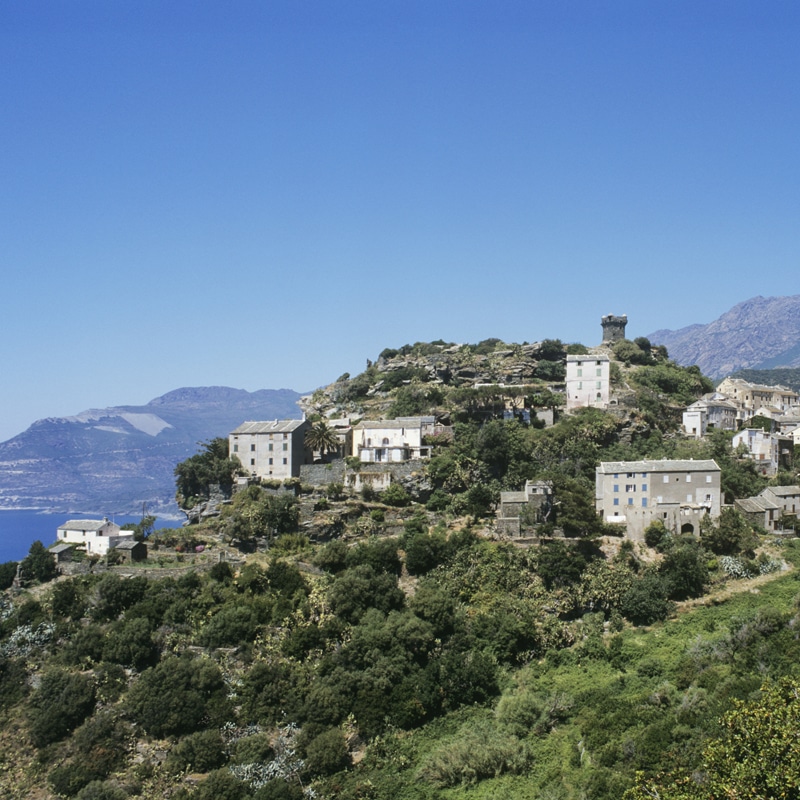Let's Talk Brocciu
The waitress doesn't like me. For days, I've tried to work up the nerve to ask someone to sit with me and share a plate of brocciu, a creamy ewe's-milk cheese unique to Corsica. But at every turn, I find the people as stoic and rugged as their landscape. It's the same treatment here above the port of Centuri. Yet, behind this woman's icy facade, I think I detect some compassion. "Would you join me for a bite?" I ask. She turns away. It's a touchy subject, cheese.
Brocciu is no run-of-the-mill foodstuff. It's made from the milk of sheep that graze freely in highlands rich in plants like asphodel and lentisk, as well as rosemary. It's earned a culinary stamp of approval usually reserved for fine wine. Since arriving in Corsica, I've eaten it in omelets and desserts. I've even tasted the sacred stuff in a farmhouse soup. Always alone. I've yet to eat it with an islander. Nobody will even talk about it.
On a quest for cheese and chat, I'd started out in Cap Corse, a mountainous peninsula that lifts a 25-mile-long finger at the French Riviera, 110 miles to the north. Each evening, I dined on mussels, duck gizzards and wild boar raised along the serried coastline. After three days, I felt pangs of loneliness. "I've lived here four years," an English exile in Centuri confessed to me. "I still earn little more than a passing nod from my neighbors." So now I drive inland, deep into brocciu territory, climbing a bowl of valleys and stone-built villages. Isolated by topography — and the fierce sense of independence that remoteness often breeds — the Balagne region feels as if it got left behind while the rest of the world marched on. Bells resound in the campanile at Sant'Antonino — population: 70. I see a cluster of wizened elders.
"Is there a brocciu maker here?" I ask. My query earns me a silent stare.
I push on to Belgodère, where narrow alleys encircle a 300-foot cliff, and call out to a black-shrouded woman scuttling through the back streets: "Is there a restaurant open, ma'am?" No answer.
It's not me, I realize; it's them. After enduring two millenniums of invasions by Greeks, Romans, Moors, Pisans, Genovese and French, Corsicans now have mistrust in their DNA. They take refuge in their outlawed native language, Corsu, and — yes — in cheese-making. They once protected their society from invaders; now they protect it from me.
Corsicans took to the hills to nurture their pastoral traditions. So that's where I'm headed. Up serpentine roads. Swerving to avoid milling pigs. Slowing for seminomadic shepherds. I draw up to the ancient hamlet of Venaco.
The traffic is my first surprise. I've barely heard a motor in days, and yet the streets of Venaco are packed. Something special is happening. I join a line leading to tents in a stonewalled field. Could that be the aroma of asphodel wafting by? It's chance that has led me to Venaco. But it's destiny that decrees I arrive on day one of a country fair dedicated entirely to cheese.
The sonorous "parp" of a conch shell played like a hunting horn greets me at the entrance. Inside a large tent, bearded farmers display pork loin flavored with acorns and prizuttu, a ham cured for three years to acquire its hazelnut tang. Stalls are filled with liquors flavored by just about every nettle, root and herb that grows in the Mediterranean basin. Behind towers of red-skinned, bacteria-washed cheese, I find a lone farmer with cheer in his eyes. "Try?" he asks, indicating his pot of prized goat's cheese cut with apple brandy. I point instead to roundels of dark, ribbed rind. A single word escapes my lips: "Brocciu!"
He stiffens a bit. I slice the brocciu's speckled skin, and a sweet, creamy whey oozes from the cut. I take a chunk and offer him the plate, which seems to hang heavily for a moment. Will he be my brocciu date? He grabs a piece, his face breaking into a lopsided grin.
The cheese fills my mouth like thick yogurt. The farmer locks his eyes on me. His face says what I should have known all along: Brocciu is more than cheese; it's an island on a plate.
